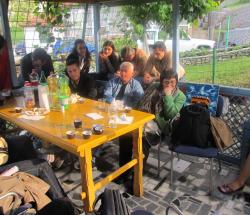| Brief description | Improve the quality of life of mental health patients through the promotion of a new model of psychiatric assistance as well as a new model of resocialisation of mental health patients in their own society and community and in a cross-border environment. |
|---|---|
| Region | Intra Western Balkan borders |
| Countries | Serbia (SRB) – Bosnia and Herzegovina (BiH) |
| Location | SRB: Kolubarski District, City of Valjevo BiH: Nort East Region – Canton of Tuzla, City of Tuzla |
| Type of project partners | Non-governmental organisations (international/national NGOs) Public bodies/institutions |
| Size (total budget including EU grants) | € 200,000 to € 500,000 |
| Main themes | Employment, labour mobility and social inclusion |
| Keywords (Types of Activities) | Education and training Research and studies Publications, websites, databases Marketing, promotional activities, awareness campaigns |
| Keywords (Aspects of Good Practice) | Genuine cross-border dimension Genuine cross-border impact Innovative Efficient Good dissemination Good sustainability |




